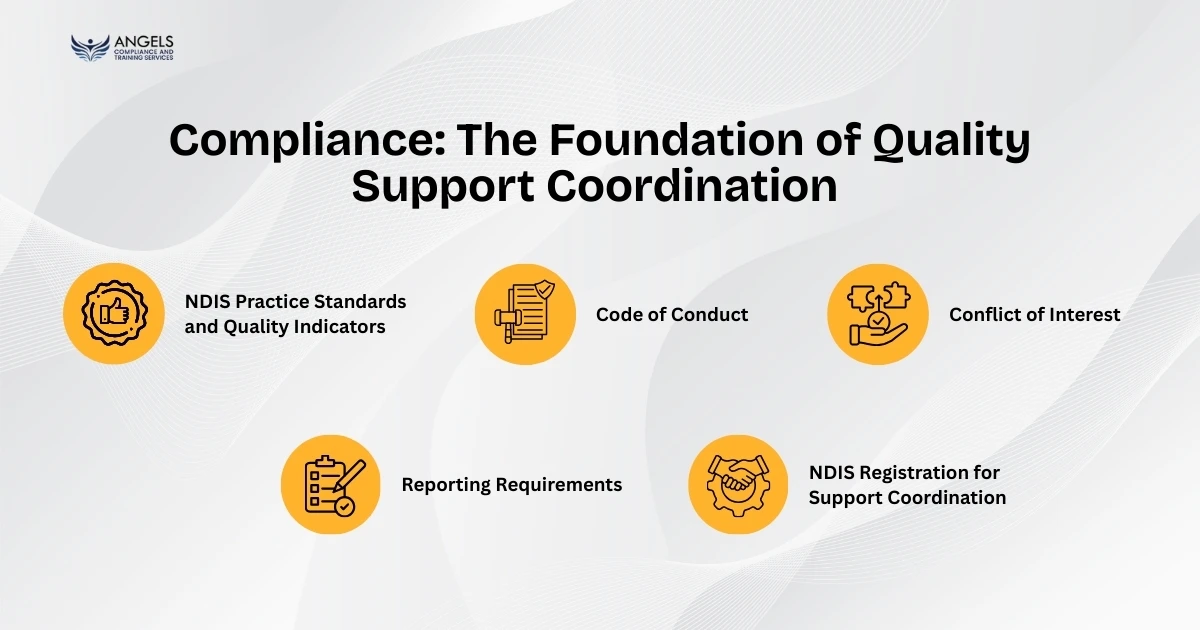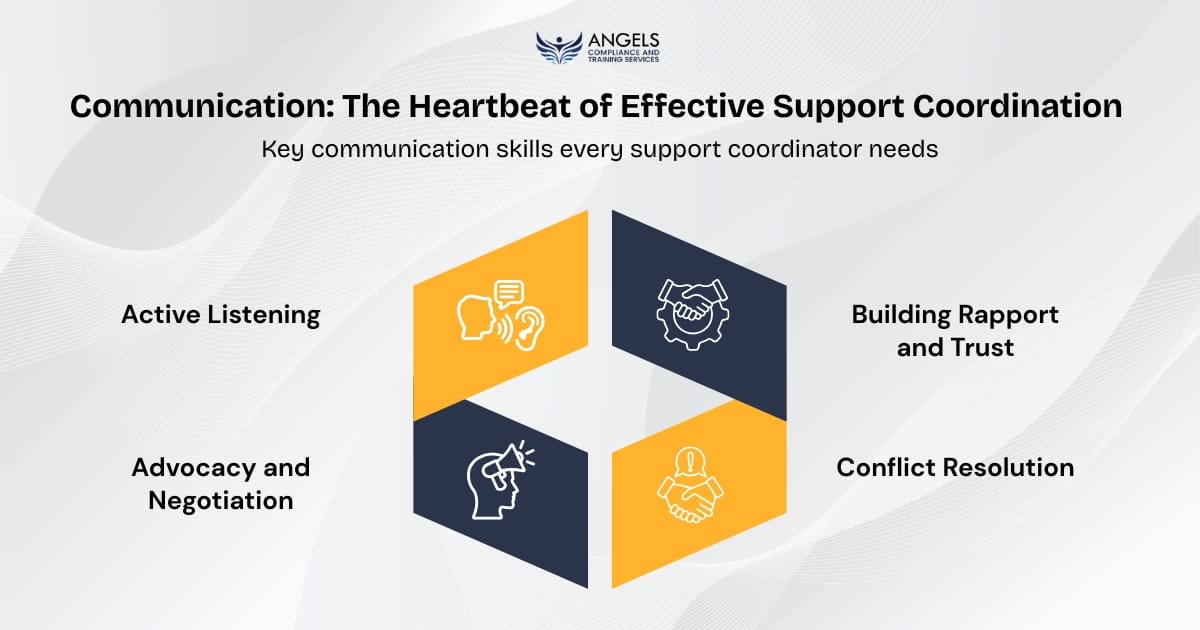Navigating the National Disability Insurance Scheme (NDIS) can be overwhelming for participants and their families. With multiple providers, plans, and paperwork to manage, many people feel lost about where to start or how to make the most of their funding. That’s where NDIS support coordination comes in.
A support coordinator acts as the guiding hand someone who helps participants understand their plan, connect with the right services, and build skills for independence. At the heart of effective support coordination lie three critical pillars: Compliance, Capacity, and Communication.
In this guide, we’ll unpack these essentials, helping participants, families, and providers better understand the role of support coordination and why it’s vital for success within the NDIS.
What is NDIS Support Coordination and Why is it Crucial?
Think of an NDIS support coordinator as a project manager for your NDIS plan. They’re not there to provide direct therapy or daily care, but rather to help you bring all the moving parts of your plan together so you can achieve your goals.
The NDIS offers three levels of support coordination:
- Support Connection – A short-term option that helps participants understand and begin using their NDIS plan.
- Support Coordination – The most common level, where the coordinator works with participants to connect with providers, manage budgets, and monitor progress.
- Specialist Support Coordination – A higher level of support for participants with complex needs, requiring advanced skills and knowledge.
The benefits of effective support coordination are clear:
- Ensuring participants maximise their NDIS funding.
- Reducing stress by managing the administrative side of NDIS.
- Helping participants connect with the right providers at the right time.
- Building independence and long-term capacity.
Without a skilled support coordinator, many participants risk under-utilising their funding or missing opportunities for growth.
Compliance: The Foundation of Quality Support Coordination

Compliance isn’t the most glamorous aspect of support coordination, but it’s absolutely essential. It ensures participants are safe, providers deliver quality services, and funds are used appropriately.
Here are the key areas every support coordinator must understand:
1. NDIS Practice Standards and Quality Indicators
The NDIS Practice Standards set the benchmark for quality and safety. They cover everything from risk management to participant rights and are monitored by the NDIS Quality and Safeguards Commission. Coordinators must be familiar with these standards to ensure participants receive services that meet national expectations.
2. Code of Conduct
Support coordinators and providers must follow the NDIS Code of Conduct. This means treating participants with respect, acting with integrity, and delivering services safely and responsibly.
3. Conflict of Interest
Transparency is crucial. A support coordinator should recommend providers based on the participant’s best interests not personal relationships or financial gain. For example, if a provider owns both a therapy service and a support coordination business, they must clearly disclose this to avoid conflicts.
4. Reporting Requirements
Compliance also involves timely reporting. Support coordinators need to submit progress reports, incident reports, and updates to ensure participants’ plans remain on track.
5. NDIS Registration for Support Coordination
While not all coordinators are registered providers, working with a registered NDIS provider offers reassurance. Registered providers are audited against strict compliance standards, which gives participants confidence that they’re receiving safe and ethical services.
At Angels Compliance and Training services, compliance isn’t just about ticking boxes it’s about upholding trust. By following NDIS compliance standards, we ensure participants receive transparent, accountable, and high-quality support.
Capacity Building: Empowering Participants to Achieve Their Goals

At its core, capacity building is about more than managing services, it’s about helping participants live more independently and confidently. Support coordination plays a central role in empowering participants to grow their skills and take control of their lives.
Here’s how capacity building comes to life:
1. Goal Setting and Achievement
Support coordinators help participants break big dreams into manageable goals. For example, if a participant wants to live independently, the coordinator might create a step-by-step plan that includes learning cooking skills, managing budgets, and accessing Supported Independent Living (SIL) options.
2. Skill Development
Whether it’s financial literacy, travel training, or personal organisation, support coordinators connect participants to programs that build essential life skills. These skills not only support independence but also increase confidence and social inclusion.
3. Community and Social Inclusion
A big part of capacity building is helping participants engage in community life. This could mean joining a local art class, volunteering, or connecting with a social group. By facilitating participation, coordinators help reduce isolation and promote belonging.
4. Introducing Technology
Technology is a powerful tool for independence. From apps that track spending to communication devices, support coordinators can introduce participants to tools that make managing their plan easier.
Communication: The Heartbeat of Effective Support Coordination

If compliance is the structure and capacity building is the engine, communication is the heartbeat of support coordination. Without strong communication, even the best-laid plans can fall apart.
Key communication skills every support coordinator needs include:
- Active Listening – Truly understanding what participants want, not just what’s written in their plan.
- Building Rapport and Trust – Developing relationships based on respect and understanding.
- Advocacy and Negotiation – Ensuring participants’ voices are heard when dealing with providers or the NDIA.
- Conflict Resolution – Managing disagreements between participants and providers, or within families, with professionalism and empathy.
Support coordination involves juggling communication between participants, families, providers, and the NDIA. Clear, consistent, and respectful communication ensures everyone is working toward the same goals.
Understanding NDIS Specialist Support Coordination
Not all participants need specialist support, but for those living with complex circumstances, NDIS specialist support coordination can be a game-changer. It is designed to step in where traditional coordination might not be enough, providing participants with a higher level of expertise, guidance, and structure to navigate difficult situations.
a.What is it?
Specialist support coordination is a tailored, intensive form of coordination. Unlike general support coordination, which focuses on connecting participants to providers and helping them build skills, this level goes much deeper. It addresses crisis points, manages high levels of risk, and builds systems of support that create stability in otherwise unstable situations.
b. Who is it for?
This service is specifically intended for participants with significant or multifaceted needs, such as:
- Complex medical conditions requiring multiple providers working together.
- People involved in multiple service systems such as the justice system, mental health services, or housing support.
- Participants at risk of homelessness, family breakdown, or ongoing instability who need structured and consistent intervention.
What do specialist support coordinators do?
Specialist coordinators use advanced problem-solving and sector knowledge to reduce risks, respond quickly to crises, and help participants create sustainable long-term plans. They collaborate with a wide network of providers, agencies, and community resources to establish a safety net around the participant. More importantly, they empower individuals by ensuring that their voice and choices remain central in every decision, even in complex and high-pressure environments.
This higher level of support is essential for participants who require a steady, skilled professional to navigate challenges and create lasting pathways toward independence.
Conclusion
Support coordination goes beyond managing a plan it’s about empowering participants to take control of their journey. By focusing on the three essential pillars Compliance, Capacity, and Communication support coordinators provide the structure, skills, and advocacy needed to ensure every NDIS plan delivers real outcomes. Compliance creates safety and accountability, capacity building nurtures independence, and communication strengthens connections between participants, families, and providers. Together, these elements transform challenges into opportunities for growth. With the right guidance, participants can confidently navigate the NDIS, unlock their potential, and build meaningful, independent, and fulfilling lives.
